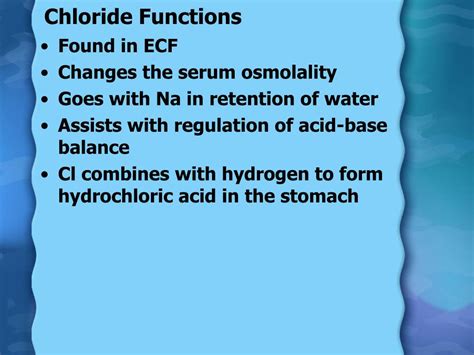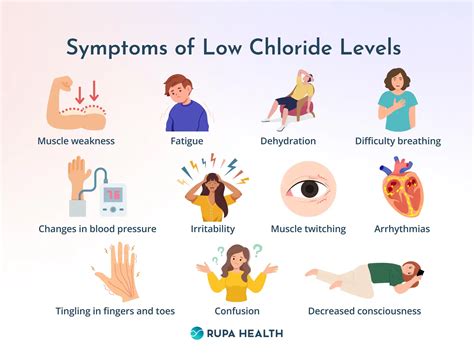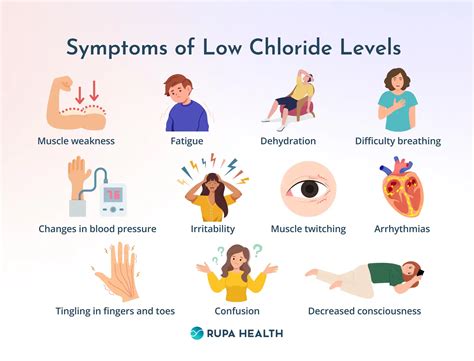Intro
Understand low chloride blood test results, causes, and symptoms. Learn about hypochloremia, electrolyte imbalance, and related kidney function, hormone regulation, and metabolic disorders.
Chloride is an essential electrolyte in the human body, playing a crucial role in maintaining fluid balance, nerve function, and muscle contractions. A low chloride blood test result can be a cause for concern, as it may indicate an underlying medical condition that requires attention. In this article, we will delve into the world of low chloride blood test results, exploring their significance, possible causes, and the necessary steps to take if you receive such a diagnosis.
The importance of understanding low chloride blood test results cannot be overstated. Chloride is the most abundant anion in the body, and its levels are closely linked to those of sodium, another vital electrolyte. An imbalance of chloride can disrupt various bodily functions, leading to a range of symptoms, from mild to severe. By grasping the concept of low chloride blood test results, individuals can better navigate the complexities of their health and make informed decisions about their well-being.
A low chloride blood test result is typically defined as a chloride level below 96 mEq/L (milliequivalents per liter). However, it is essential to note that the reference range may vary slightly depending on the laboratory and the individual's age, sex, and medical history. If you receive a low chloride blood test result, it is crucial to consult with your healthcare provider to determine the underlying cause and develop an appropriate treatment plan.
Understanding Chloride and Its Functions

Chloride is a negatively charged ion that plays a vital role in various bodily functions, including maintaining fluid balance, regulating blood pressure, and facilitating nerve and muscle function. It is also involved in the production of digestive fluids, such as stomach acid and pancreatic juice. Chloride is absorbed into the bloodstream through the digestive system and is then distributed to various tissues and organs. Any disruption in chloride levels can have far-reaching consequences, making it essential to understand the factors that influence its balance.
Factors Influencing Chloride Levels
Several factors can contribute to low chloride blood test results, including: * Dehydration or excessive fluid loss * Certain medications, such as diuretics or laxatives * Underlying medical conditions, such as kidney disease or respiratory disorders * Poor dietary intake of chloride-rich foods * Hormonal imbalances, particularly those affecting the adrenal glandsCauses of Low Chloride Blood Test Results

There are several potential causes of low chloride blood test results, ranging from mild to severe. Some of the most common causes include:
- Dehydration: Excessive fluid loss due to vomiting, diarrhea, or sweating can lead to a decrease in chloride levels.
- Metabolic alkalosis: This condition occurs when the body's blood pH becomes too alkaline, often due to excessive vomiting or the use of certain medications.
- Kidney disease: Certain kidney disorders, such as renal tubular acidosis, can disrupt chloride reabsorption, leading to low levels.
- Respiratory acidosis: This condition occurs when the lungs cannot remove enough carbon dioxide, leading to an imbalance in electrolytes, including chloride.
Symptoms of Low Chloride Blood Test Results
The symptoms of low chloride blood test results can vary depending on the underlying cause and severity of the condition. Some common symptoms include: * Muscle weakness or cramps * Fatigue or lethargy * Nausea or vomiting * Abdominal cramps or diarrhea * Confusion or disorientationDiagnosing Low Chloride Blood Test Results

Diagnosing low chloride blood test results typically involves a combination of physical examination, medical history, and laboratory tests. Your healthcare provider may order a range of tests, including:
- Electrolyte panel: This test measures the levels of various electrolytes, including chloride, sodium, potassium, and bicarbonate.
- Blood gas analysis: This test evaluates the levels of oxygen, carbon dioxide, and pH in the blood.
- Urine tests: These tests can help identify underlying kidney or urinary tract disorders.
- Imaging studies: In some cases, imaging studies, such as X-rays or CT scans, may be ordered to rule out underlying conditions, such as kidney stones or respiratory disorders.
Treatment Options for Low Chloride Blood Test Results
Treatment for low chloride blood test results depends on the underlying cause and severity of the condition. Some common treatment options include: * Fluid replacement: In cases of dehydration, fluid replacement with electrolyte-rich solutions can help restore chloride levels. * Medications: Certain medications, such as potassium-sparing diuretics, can help manage chloride levels. * Dietary changes: Increasing dietary intake of chloride-rich foods, such as seaweed or celery, can help maintain healthy chloride levels. * Underlying condition management: Treating underlying medical conditions, such as kidney disease or respiratory disorders, can help alleviate low chloride blood test results.Preventing Low Chloride Blood Test Results

Preventing low chloride blood test results involves maintaining a healthy lifestyle and being mindful of factors that can influence chloride levels. Some tips for prevention include:
- Staying hydrated: Drinking plenty of water and electrolyte-rich fluids can help maintain healthy chloride levels.
- Eating a balanced diet: Consuming a diet rich in chloride-rich foods, such as fruits, vegetables, and whole grains, can help support healthy chloride levels.
- Managing underlying conditions: Controlling underlying medical conditions, such as kidney disease or respiratory disorders, can help prevent low chloride blood test results.
- Avoiding excessive medication use: Being mindful of medication use and avoiding excessive consumption of diuretics or laxatives can help prevent low chloride blood test results.
Conclusion and Next Steps
Receiving a low chloride blood test result can be a concerning experience, but by understanding the causes, symptoms, and treatment options, individuals can take proactive steps to manage their health. If you have received a low chloride blood test result, it is essential to consult with your healthcare provider to determine the underlying cause and develop an effective treatment plan. By working together with your healthcare team and making informed lifestyle choices, you can maintain healthy chloride levels and reduce the risk of complications.What are the common causes of low chloride blood test results?
+Common causes of low chloride blood test results include dehydration, metabolic alkalosis, kidney disease, and respiratory acidosis.
What are the symptoms of low chloride blood test results?
+Symptoms of low chloride blood test results can include muscle weakness, fatigue, nausea, abdominal cramps, and confusion.
How are low chloride blood test results diagnosed?
+Diagnosing low chloride blood test results typically involves a combination of physical examination, medical history, and laboratory tests, including electrolyte panels, blood gas analysis, and urine tests.
We hope this article has provided you with a comprehensive understanding of low chloride blood test results. If you have any further questions or concerns, please do not hesitate to reach out to your healthcare provider. Additionally, we invite you to share your experiences and insights in the comments section below, and to share this article with anyone who may benefit from this information. By working together, we can promote greater awareness and understanding of this important health topic.
